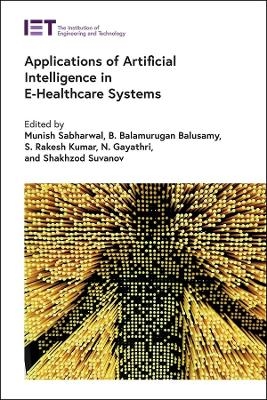
Applications of Artificial Intelligence in E-Healthcare Systems
Institution of Engineering and Technology (Verlag)
978-1-83953-449-2 (ISBN)
Increased use of artificial intelligence (AI) is being deployed in many hospitals and healthcare settings to help improve health care service delivery. Machine learning (ML) and deep learning (DL) tools can help guide physicians with tasks such as diagnosis and detection of diseases and assisting with medical decision making.
This edited book outlines novel applications of AI in e-healthcare. It includes various real-time/offline applications and case studies in the field of e-Healthcare, such as image recognition tools for assisting with tuberculosis diagnosis from x-ray data, ML tools for cancer disease prediction, and visualisation techniques for predicting the outbreak and spread of Covid-19.
Heterogenous recurrent convolution neural networks for risk prediction in electronic healthcare record datasets are also reviewed.
Suitable for an audience of computer scientists and healthcare engineers, the main objective of this book is to demonstrate effective use of AI in healthcare by describing and promoting innovative case studies and finding the scope for improvement across healthcare services.
Munish Sabharwal is a professor and the dean of the School of Computing Science and Engineering at Galgotias University, India. He is a member of numerous engineering societies spanning USA, Singapore, India, and China and a fellow of the Centre for Education Growth and Research (India) and of the Institute of Electronics and Telecommunication Engineers (India). His research interests include Artificial Intelligence, Machine Learning, Biometrics, and E-Banking. B. Balamurugan Balusamy is an associate Dean-Student Engagement at Shiv Nadar University, Delhi-National Capital Region (NCR), India. He is a previous recipient of the IBM Developer Superstar Award and the CSC-VIT Best Faculty Coordinator Award. His current research interests include Internet of Things technologies and blockchain applications for healthcare. He is a member of Association for Computing Machinery, the Computer Society of India, and the International Association of Engineers. S. Rakesh Kumar is an assistant professor of Computer Science at Galgotias University, India. His research interests include big data analytics, Internet of Things technologies, artificial intelligence and machine learning. He is a member of Association for Computing Machinery, the Computer Society of India, and the International Association of Engineers. N. Gayathri is an associate professor of Computer Science and Engineering at Galgotias University, India. She is a member of Association for Computing Machinery, the Computer Society of India, and the International Association of Engineers. Shakhzod Suvanov is a lecturer and research scholar in the Faculty of Digital Technologies at Samarkand State University, Uzbekistan. His research interests include machine learning, artificial neural network, mathematical modeling, and dynamical systems.
Chapter 1: Introduction to AI in E-healthcare
Chapter 2: The scope and future outlook of artificial intelligence in healthcare systems
Chapter 3: Class dependency-based learning using Bi-LSTM coupled with the transfer learning of VGG16 for the diagnosis of tuberculosis from chest X-rays
Chapter 4: Drug discovery clinical trial exploratory process and bioactivity analysis optimizer using deep convolutional neural network for E-prosperity
Chapter 5: An automated NLP methodology to predict ICU mortality CLINICAL dataset using multiclass grouping with LSTM RNN approach
Chapter 6: Applying machine learning techniques to build a hybrid machine learning model for cancer prediction
Chapter 7: AI in healthcare: challenges and opportunities
Chapter 8: Impression of artificial intelligence in e-healthcare medical applications
Chapter 9: Heterogeneous recurrent convolution neural network for risk prediction in the EHR dataset
Chapter 10: A narrative review and impacts on trust for data in the healthcare industry using artificial intelligence
Chapter 11: Analysis of COVID-19 outbreak using data visualization techniques: a review
Chapter 12: Artificial intelligence-based electronic health records for healthcare
Chapter 13: Automatic structuring on Chinese ultrasound report of Covid-19 diseases via natural language processing
| Erscheinungsdatum | 05.09.2022 |
|---|---|
| Reihe/Serie | Healthcare Technologies |
| Verlagsort | Stevenage |
| Sprache | englisch |
| Maße | 156 x 234 mm |
| Themenwelt | Informatik ► Theorie / Studium ► Künstliche Intelligenz / Robotik |
| Medizin / Pharmazie ► Gesundheitswesen | |
| ISBN-10 | 1-83953-449-4 / 1839534494 |
| ISBN-13 | 978-1-83953-449-2 / 9781839534492 |
| Zustand | Neuware |
| Haben Sie eine Frage zum Produkt? |
aus dem Bereich


